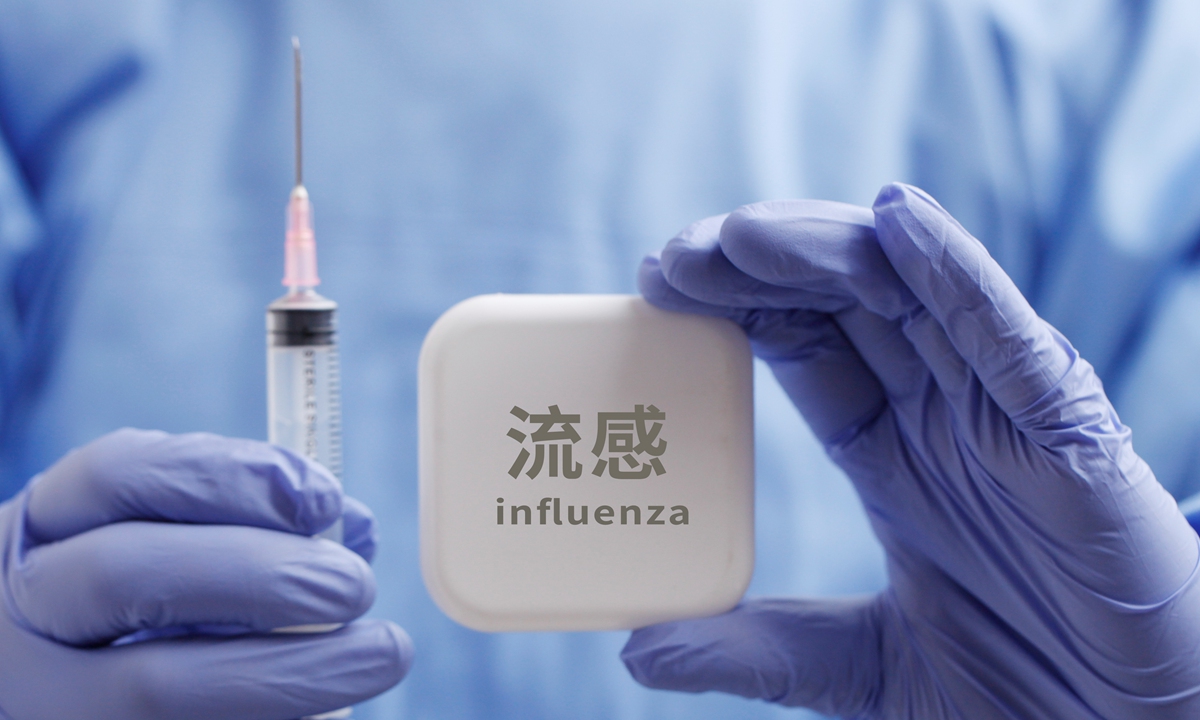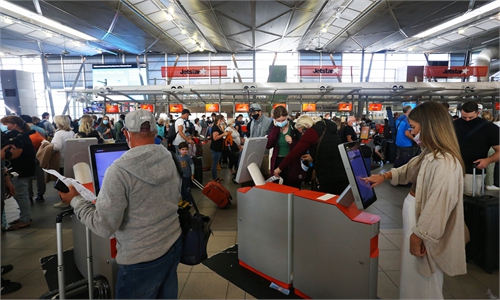
Influenza Photo: CFP
China's health experts eased public concern over the "twindemic" scenario of COVID-19 and influenza, saying that China has built a mature response mechanism to address the problem, while the Chinese Center for Disease Control and Prevention (China CDC) warned that the upcoming influenza peak season in fall and winter is expected to see a higher prevalence of influenza although the COVID-19 epidemic is yet to end.
The risk of a combination of influenza and COVID-19 epidemic this fall and winter would be high, Dong Xiaoping, a chief virologist from the China CDC, warned during Wednesday's press conference.
The COVID-19 situation in China has been grave, with daily infections on Wednesday reaching nearly 2,000. Officials said at least nine provinces have reported cases surpassing 100, and the situation in South China's Hainan, Northwest China's Xinjiang Uygur Autonomous Region and Southwest China's Xizang (Tibet) Autonomous Region are still developing.
The China CDC Weekly issued on August 5 showed that the positive rates of the influenza virus in some southern provinces are still at a high stage, predominantly the influenza A (H3N2) subtype. Among the six detected influenza outbreaks, five of them were connected to H3N2.
During the week of July 25-31, hospitals in southern China reported a 4.3 percentage of influenza-like illness cases, similar to the previous week and higher than the same period in 2019-2021, which were respectively, 3.5 percent, 2.7 percent and 3.3 percent. The percentage of influenza-like cases in northern China is about 2.1 percent, the weekly report showed.
The Global Times found that several provinces including South China's Guangdong, East China's Jiangsu and Northeast China's Jilin and Heilongjiang have issued alerts to the public about a possible peak season for influenza during the upcoming autumn and winter. They suggested that people, especially in vulnerable groups, promptly get vaccines against influenza and maintain personal hygiene in their daily lives.
Some places in Guangdong, Southwest China's Sichuan and East China's Fujian, which have had surging flu cases in the summer, kicked off mass flu vaccination as early as June. In Hainan Province, the country's first quadrivalent influenza vaccine for children has been available to local children aged under three since July 31.
Shao Yiming, a leading virologist and immunologist at the China CDC, told the Global Times that "we should be vigilant about the dual existence of influenza and COVID-19, but the good news is that China has about three years of experience in handling this risk. An effective mechanism to address the risk is able to ensure that if there is an epidemic, necessary measures will be followed."
Dong said China has built a system to monitor the prevalence of influenza and COVID-19, which can release precautionary messages to the public in a timely manner, and hospitals' fever clinics are also able to screen patients for different infections.
But Lu Hongzhou, director of the Third People's Hospital of Shenzhen, told the Global Times that coinfection with COVID-19 and influenza should be seriously considered in this "twindemic" scenario, as interactions between COVID-19 and influenza are complicated and not fully understood in the medical field.
Measures against COVID-19 may reduce contact with influenza, subsequently reducing the adaptive immunity against influenza among the general population. Influenza might not be center stage right now, but insufficient adaptive immunity among the population may potentially trigger a future influenza pandemic, according to a paper led by Lu published on bio-science journal BioScience Trends in July.
Coinfection with COVID-19 and influenza might be a thorny problem, the paper said, calling for more effective vaccines and antiviral treatments to be developed and correct knowledge regarding the prevention of COVID-19 and influenza to be updated and conveyed to the public.
Fosun Pharma said in a statement it sent to the Global Times on Thursday that oral drug for COVID-19 treatment Azvudine produced by Genuine Biotech Limited, based in Central China's Henan Province have been delivered to epidemic-hit regions, including Hainan, Henan and Xinjiang. The country has also approved Pfizer's COVID-19 pill Paxlovid and the domestic neutralizing antibody therapy BRII-196/BRII-198 for COVID-19 treatment. Every bottle of Azvudine is priced at 270 yuan ($40).
On July 28, the China CDC launched a clinical trials covering nearly 20 COVID-19 vaccines developed from various methods like inactivated vaccines, recombinant vaccines and mRNA vaccines to test the safety and efficacy of these vaccines used as booster shots.

